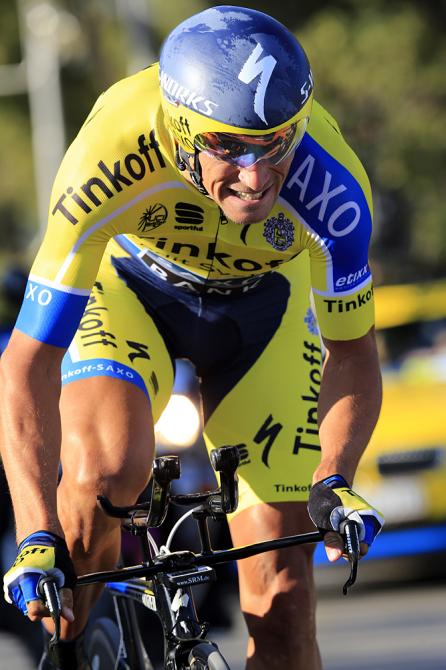Kreuziger to appeal to CAS after UCI Biological Passport suspension
Tinkoff-Saxo rider suggests his blood value variation was caused by dehydration

Roman Kreuziger has announced that he will appeal to the Court of Arbitration for Sport (CAS) in an attempt to overturn the suspension imposed by the UCI due to his ongoing Biological Passport case. The Tinkoff-Saxo rider hopes for a temporary lifting of the ban by CAS before his case is heard so he can to ride the Vuelta a Espana.
The UCI suspended the Czech rider on Saturday August 2, stopping him from competing at the Tour of Poland. He agreed to miss the Tour de France after the UCI's Anti-Doping Foundation (CAFD) had found anomalies in his biological passport between 2011 and 2012 and informed him that he was formally under investigation. However, Kreuziger was not initially suspended by the UCI or his team.
In a carefully worded statement, Kreuziger has suggested that his blood values "only approached the limits (of the Biological Passport) on one occasion, which was caused by extreme dehydration after (an unsuccessful) mountain stage of the Giro d’Italia 2012." He also claims three experts backing his claim that the CAFD panel is wrong in its judgement.
“I am deeply frustrated by this current situation, which makes it impossible for me to do my job and ride my bike. I’m not a cheat, and I have not committed any doping offence," Kreuziger said in a statement on his personal website.
"Experts confirm that there is no evidence of any alleged anti-doping rule violation in my case. This has been going on since June 2013, and still there is no formal case opened against me. Despite this I’m now provisionally suspended. I sincerely hope that this situation can be resolved quickly and not turned into a political matter."
The alleged Biological Passport violations are from 2011 and 2012, when Kreuziger rode for Alexandre Vinkourov's Astana team. He joined Tinkoff-Saxo in 2013.
“I am grateful to my team, Tinkoff-Saxo, for their support, and it helps me to know they trust me and have faith in me based on our working relationship and the expert opinions on my case,” he said.
Get The Leadout Newsletter
The latest race content, interviews, features, reviews and expert buying guides, direct to your inbox!
A legal battle over anti-doping rules
Kreuziger's appeal to CAS is expected to be a legal battle regarding interpretation of the UCI Anti-doping rules and the integration of the Biological Passport rules with those for traditional anti-doping cases.
Kreuziger and his legal counsel claims there is no basis in the current UCI legislation allowing for the imposition of a provisional suspension apart unless in cases of a positive A sample of an anti-doping test.
However, Cyclingnews understands that the UCI imposed rules number 242 and 313 to suspend Kreuziger even though he has yet to face a disciplinary hearing or be found guilty of doping.
Rules 242 reads: "…the Anti-Doping Commission or one of its members may ban the Rider from participating in Events for such time that the violation, in the opinion of the Anti-Doping Commission or such member, is likely to affect the Rider’s results."
The UCI clearly believes Kreuziger has a case to answer and so are against his presence in races. Any eventual ban for doping could see him disqualified from the races he competes in now and so his presence could somehow affect or falsify the results of these races.
Any confirmed suspension for doping usually includes any provisional suspensions. By trying to compete in the midst of a case, Kreuziger may be able to race in the short term and even start the Vuelta a España but could face longer time out of the sport if he is eventually found guilty of doping.

Stephen is one of the most experienced member of the Cyclingnews team, having reported on professional cycling since 1994. He has been Head of News at Cyclingnews since 2022, before which he held the position of European editor since 2012 and previously worked for Reuters, Shift Active Media, and CyclingWeekly, among other publications.